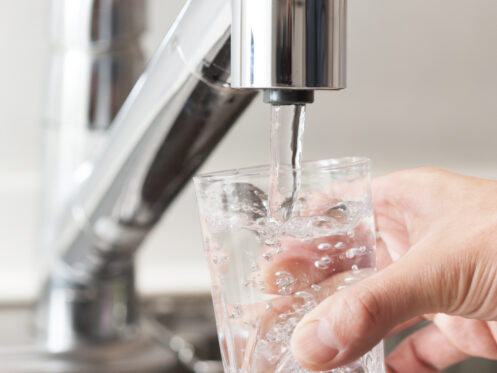Have you ever noticed chalky spots on your dishes, dry skin after a shower, or a reduced lifespan of your water-based appliances? These are common signs of hard water in your home. Hard water has a high mineral content that can cause a variety of issues for both your health and your home. Fortunately, there is a solution – water softeners.
Water Softeners in Your Home
The water you receive in your home travels through rock formations and soil before reaching your home’s plumbing system. Along the way, it picks up minerals, such as calcium and magnesium, which are responsible for water hardness. Of course, water companies try their best to remove the majority of these minerals, but some may still remain.
This is where water softeners come into play. These devices are designed to remove or reduce the concentration of hard minerals in your water, making it “softer” and more suitable for everyday use.
How Water Softeners Work
A typical home water softener system comprises a mineral tank, a brine tank, and a control valve. The mineral tank is where the actual water softening takes place. It contains resin beads that attract and trap hard calcium and magnesium ions, exchanging them for sodium or potassium ions.
The brine tank is responsible for regenerating the resin beads when they become saturated with hard minerals. Resin beads serve as the medium for ion exchange that removes hardness minerals from the water, so they need to be flushed with a salt or potassium solution periodically to continue functioning properly.
The control valve regulates the water flow through the system and controls the regeneration process. It is connected to a timer and backwashes the resin beads periodically to flush out any accumulated minerals.
Benefits of Using Water Softeners
Improved Appliance Lifespan
Hard water can cause limescale (the white, chalky residue) buildup in your appliances, such as washing machines, dishwashers, and water heaters. It interferes with electrical components, makes rubber parts brittle, clogs pipes, and reduces the water flow needed by these appliances to function efficiently. By using a water softener, your appliances will enjoy a longer lifespan and require fewer repairs.
Soft and Cleaner Clothes
Hard water doesn’t mix well with soap. The minerals in hard water react with soap to form a stubborn scum that coats your clothes. The detergent won’t lather as much, making it difficult to remove stains and dirt.
Moreover, the minerals in hard water can be abrasive on your cloth fabrics. They can cause them to become rough and wear out faster. Soft water eliminates these problems and leaves your clothes feeling softer, cleaner, and brighter.
Better Tasting Water
Water that has uncontrolled amounts of mineral ions and has passed through pipes with years of accumulated limescale is likely to have a metallic or slightly bitter taste. Even the clarity of such water is questionable. Soft water, on the other hand, has a minimal amount of these minerals; therefore, it tastes refreshing and looks clear.
Better Skin and Hair
Hard water can also have an adverse effect on your skin and hair. The minerals in hard water strip away natural oils from your skin, leaving it dry and itchy. The mineral ions present in them will clog your pores and form scum on your scalp. This can lead to irritation, acne, and dandruff.
Likewise, hard water can leave a residue on your hair after a shower, making it look dull and lifeless. It could also interact with some of your hair products, diminishing their effectiveness. Soft water, on the contrary, will keep your skin and hair hydrated and nourished.
Environmental Benefits
The excessive minerals in hard water are known to harm the environment. When hard water is used for irrigation or washing cars, it can leave behind mineral deposits on plants and vehicles. These deposits can be difficult to remove and may damage the surfaces.
In addition, soft water requires less energy to heat up compared to hard water. This means that using a water softener can help reduce your carbon footprint and save you money on heating bills.
Different Types of Water Softeners
Salt-Based Water Softeners
Salt-based water softeners work by exchanging sodium or potassium ions for water-hardening minerals. They are ideal for larger households and are efficient in removing minerals from water. However, they do require maintenance to refill the salt and regularly clean out the brine tank.
Salt-Free Water Softeners
Salt-free water softeners use a different process called chelation to bind with hard minerals and prevent them from depositing on surfaces. They don’t remove the minerals completely but instead change their chemical structure so they can’t form limescale. These types of softeners are low-maintenance, eco-friendly, and suitable for smaller households.
Dual-Tank Water Softeners
Dual-tank systems are equipped with two resin tanks. While one is operational, the other regenerates to ensure a continuous supply of softened water. This feature makes them perfect for large households with high water consumption.
Magnetic or Electronic Water Softeners
These types of water softeners use magnetic fields or electric pulses to change the structure of hard minerals in water. As a result, the calcium and magnesium ions become suspended in the water and can’t form limescale.
How to Choose the Right Water Softener for Your Home
Assess Your Water Hardness Level
The initial step in choosing a water softener is to determine how much you need for your home. Begin by measuring your water’s hardness level. You can either buy a test kit or hire a professional to conduct the test for you.
Consider Your Household Size and Water Usage
Larger households with high water usage require a bigger capacity system to ensure an adequate supply of soft water. Dual-tank systems or salt-free options are ideal for these situations. However, small households with low water usage can benefit from a single-tank system or salt/salt-free softeners.
Evaluate Your Budget and Maintenance Preferences
Water softeners come in a range of prices, and the type you choose will depend on your budget. For example, salt-based systems require regular salt refills and resin replacements, which you have to budget for. Meanwhile, magnetic or electronic systems may cost more upfront but require minimal maintenance.
Consider Your Location and Water Source
Different regions have varying water sources and quality, which can impact the type of water softener you need. For example, areas with high levels of iron or sulfur in their water may require an additional filtration system along with a water softener to address these issues. Your contractor should be able to advise you on the best options for your location.
What to Expect During the Installation Process
While some water softeners come with DIY installation kits, it’s often best to hire a professional to ensure the system is installed correctly. A professional installer will assess your plumbing, choose the best location for the softener, and ensure proper connections.
The installation process typically takes a few hours. Our team will turn off your water supply, cut into the main water line, and install the softener. They will also set up the regeneration cycle and test the system to ensure it’s working correctly.
After installation, it’s important to follow the manufacturer’s maintenance guidelines. Regularly check the salt level in your brine tank and schedule periodic inspections to keep your system running smoothly.
Call Us to Learn More
If you have been experiencing issues with hard water and are interested in learning more about water treatments, give Bumble Breeze a call today. Our team of experts can answer any questions you may have. If you live in Las Vegas, NV, they can stop by your home to assess your water quality and recommend the best solution for your needs. In addition to water softeners, we also offer HVAC replacement, maintenance, and repair services, all types of plumbing work, and indoor air quality solutions.


